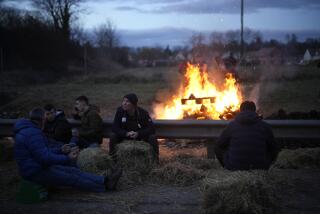Here’s How to Keep Them Down on the Farm Once They’ve Seen Paris
- Share via
BRANCION, France — Like most farmers in southern Burgundy, Yan Stapel’s work starts before dawn. Unlike his neighbors, he’s a Dutchman who left a cushy job in Amsterdam for the backbreaking life of a peasant.
Stapel and thousands of other Dutch, German, British and Belgian farmers are seen as at least a partial solution to rural France’s greatest threat: its disappearing farmers. They come because land is cheap and abundantly available for those willing to endure hard work for little pay.
More and more French farmers are not. Seduced by the easy life in the city where they typically go to high school, farmers’ sons are leaving en masse.
More densely populated northern European nations have the opposite problem--motivated farmers and others willing to work the land but not enough of it to go around.
With the gradual integration of the European Union, Germans now can settle in Burgundy as easily as New Yorkers move to Kansas, and a logical outlet for northern farmers has become migration to Europe’s breadbasket--France.
“In Holland, there’s no more room, while in France, you have regions that are completely deserted, nobody left,” said Stapel, 48. “Any Dutch farmer who sees big and wants to emigrate can succeed here.”
A chemical engineer who also grew vegetables on a plot outside Amsterdam, Stapel dropped everything 18 years ago and moved to a farm near Brancion, in eastern France. He owns 25 acres in a lush valley, where he grows grapes and bottles his own wine, which he markets himself in the Netherlands.
Agriculture Ministry figures show about 5,000 foreign farm operators in France. But the figures don’t include many small farmers like Stapel. In most rural regions, virtually everyone knows of an English rancher, a Dutch dairy farmer or a German grape grower nearby.
Experts agree the proportion of foreign farmers is increasing, just as the number of French farmers is steadily shrinking by 4.2% a year.
Despite the hemorrhage, France remains Europe’s No. 1 food producer and the world’s No. 3 grain exporter. That is because, upon retirement, farmers tend to sell out to wealthier neighbors, whose holdings get bigger and bigger.
It is in mountainous regions unsuited for large-scale mechanized farming that foreign farmers find a niche. They are usually well received by locals.
“There was a natural wariness on their part when I first arrived a few years ago. But now everybody knows me in the village and I have many friends,” said Karl Heinzelmann, a 44-year-old German who also produces wine.
As an agriculture student, he left his home on Lake Constance in southern Germany in 1980 and bought a small farm on a mountain outside Saint-Gengoux, near Brancion. Specializing in organic farming, he also raises sheep.
Stapel and Heinzelmann fit in so well they even speak French with a thick Burgundy drawl. Not surprisingly, they also share their neighbors’ frustrations: stagnating produce prices and rigid EU directives that impose wine-production caps and costly sanitary norms. But at least they can farm.
“In Germany, there’s no available land unless you’re a farmer’s son. An operation like mine would be impossible,” Heinzelmann said.
For Christophe Soulard, chief spokesman of France’s largest farmers union, FNSEA, “agriculture in France lacks arms.” So filling empty farms with eager foreign farmers is the wise thing to do, he said.
“It stems the rural exodus and, paradoxically, it helps preserve our rural cultural identity, even if they’re not French,” he said.
French agricultural policy does not specifically seek out foreign farmers. But it does offer low-interest loans and training to young farmers and city dwellers interested in farming, and the programs are open to all eligible EU citizens.
“Britain is a small country where there’s not much support for young farmers. There is in France, so many are drawn here,” said Kevin Passmore, a British real estate agent who encourages Britons to move to Burgundy.
Dutchman Pim de Roos dreams of seeing one day a European-wide rural management policy to redistribute farmers from congested northern countries to France, where they are sorely needed.
That is exactly what he has been doing for 17 years on a smaller scale. Based in the south-central town of Limoges, de Roos is co-founder of Terres d’Europe (Lands of Europe), an agency that encourages Dutch and English farmers to relocate to France and counsels those who come.
More to Read
Sign up for Essential California
The most important California stories and recommendations in your inbox every morning.
You may occasionally receive promotional content from the Los Angeles Times.













